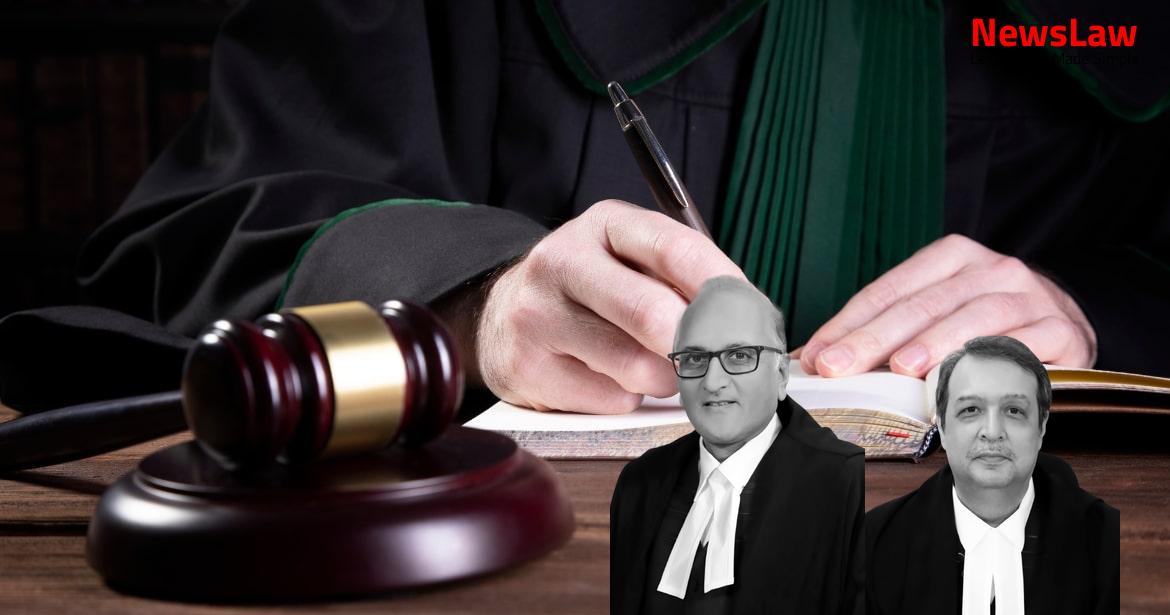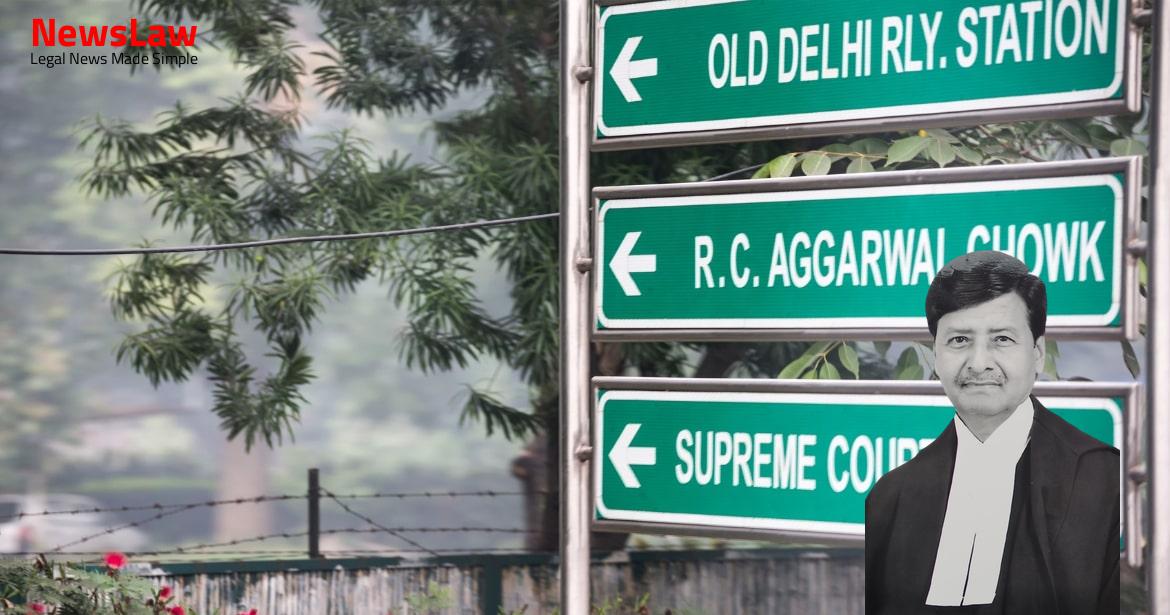In a recent landmark decision by the Supreme Court of India, the judiciary has clarified the guidelines for refund applications in customs assessment disputes. This ruling provides important insights into the legal framework governing such cases. Stay informed about the implications of this judgment by reading our detailed analysis.
Facts
- The appellants availed exemption under Notification No.67/95-CE for waste paper/fresh broke.
- A refund claim was filed for an amount of Rs.28,73,120/- in respect of duty paid on waste paper/broke during July 2001 to March 2002 under section 11(b) of the 1944 Act.
- Show cause notice was issued regarding the refund claim and subsequently rejected by the assessment committee, Commissioner of Appeals, and Tribunal.
- An appeal was filed under section 35(b) of the 1944 Act challenging the rejection of the refund claim.
- The case involved different duty rates for paper manufactured from conventional and unconventional raw materials.
- After a physical examination, an assessment order was passed for the relevant period.
- The appellant realized a mistake in availing the exemption under Notification No.67/95-CE and ceased availing it from May 2001 onwards.
- The appellant had been paying duty on paper cleared from its factory.
- The appeal was allowed by the Commissioner of Appeals but the Tribunal rejected the refund claim stating it cannot be adjudicated on merits.
- The High Court clarified that self-assessment is not considered an assessment order in the context of Section 27(1) (i) before 8.4.2011.
- The High Court allowed the writ petition based on this clarification.
- The Assistant Commissioner (Refunds) rejected all claims due to lack of evidence of excess duty payment.
- He stated that the Bills of Entry had already been assessed and any modifications could only be done through appeal.
Also Read: Urs Family Property Dispute: Supreme Court Decree
Issue
- The issue in these appeals is whether a refund application against the assessed duty can be entertained in the absence of challenge to the order of assessment in appeal.
- ITC Limited case held that no refund application can be entertained unless the order of assessment is appealed.
- High Court of Delhi framed question on whether non-filing of appeal against the assessed Bill of Entry where there was no lis between importer and Revenue will deprive the importer of the right to file a refund claim under Section 27 of the Customs Act, 1962.
- High Court interpreted Section 27 of the Act to allow refund applications in cases where there is no assessed order to challenge due to no contest or lis, as covered by Section 27(i)(ii).
- Similar opinion given by High Court of Madras.
- Important change noted in Section 27 of the Customs Act by High Court of Delhi allowing refund claims as long as duty or interest was paid or borne by the person.
Also Read: Promissory Estoppel and Public Interest: Union of India vs. M/s Dharampal Satyapal Ltd.
Analysis
- The amended provisions of the Customs Act introduced self-assessment for bills of entry by importers/exporters.
- The self-assessment done by importers/exporters is considered as an order of assessment.
- Refund claims can be made by individuals who have paid duty as per the order of assessment or have borne the duty.
- The limitation period for refund claims is one year from the date of payment of duty, unless paid under protest.
- The assessment includes provisional assessment, self-assessment, reassessment, and any assessment with zero duty.
- The amended Section 17 allows for self-assessment of duty by importers/exporters.
- A speaking order is necessary in case of re-assessment under Section 17(5) if it contradicts the importer/exporter’s claims.
- The refund application is not an appeal and does not require modification or review of the assessment order.
- The officer processing the refund cannot reassess the duty or review the assessment order.
- The application for refund should be made within six months from the date of payment of duty.
- The officer may verify the self-assessment and examine or test the goods, but cannot reassess the duty unless deemed necessary.
- Taxing statute must be strictly interpreted, no room for inference
- Cases cited for dismissal of appellant’s application
- Non-challenge of an appealable order renders subsequent refund claims invalid
- Relevance of speaking order for filing an appeal under Customs Act
- Self-assessment under the Act considered as an assessment
- Claiming benefit of notification without challenging assessment is not allowed
- Refund claims cannot question the acceptance of self-assessment
- Refund claim not considered as an appellate proceeding
- Quantification of CVD for imported articles discussed in relation to excise duty
- Prior cases and judgments considered for the given scenario
- Judicial view on assessment being payable as per the order passed
- Section 28 of the Customs Act deals with the recovery of duties not levied or not paid or short-levied or short-paid or erroneously refunded.
- Section 17 of the Customs Act, prior to the 2011 amendment, governed the assessment of duty.
- The Finance Act of 2011 introduced changes to Section 17, now requiring importers and exporters to self-assess the duty leviable on goods.
- The proper officer is authorized to verify the self-assessment and re-assess the duty if necessary.
- A speaking order must be passed within fifteen days in cases where re-assessment is contrary to the self-assessment.
- Notifications issued under the first proviso can be rescinded by the Central Government at any time.
- The Central Government must seek approval from Parliament for any such notification.
- The limitation of one year for refund claims does not apply where duty or interest has been paid under protest.
- Various scenarios for the refund of duty and interest paid are specified in the provisions.
- The application for a refund must be accompanied by documentary evidence showing that the duty or interest was paid by the applicant and not passed on to others.
- Section 27 relates to the claim for a refund of duty, and its provisions were also amended by the Finance Act of 2011.
- Previously, Section 27 allowed for the refund of duty paid in pursuance of an order of assessment or borne by the claimant.
- Section 128 outlines the process for appeals to the Commissioner (Appeals) against decisions or orders passed under the Customs Act by lower-ranking customs officers.
- The scope of the provisions of refund under Section 27 cannot be enlarged.
- Refund claims cannot be entertained without modifying the order of assessment or self-assessment in accordance with the law.
- Section 27 does not allow setting aside the order of self-assessment for reassessing the duty for making a refund.
- If aggrieved by any order, including self-assessment, it must be modified under Section 128 or other relevant provisions of the Act.
- The reasoning of the High Courts of Delhi and Madras on this matter is not considered sound.
Also Read: Jurisdictional Interpretation in Kamlesh Babu v. Lajpat Rai Sharma
Decision
- The orders passed by Customs, Excise, and Service Tax Appellate Tribunal are upheld.
- The orders passed by the High Courts of Delhi and Madras are set aside.
- Applications for refund were deemed not maintainable.
- The appeals have been disposed of accordingly.
Case Title: ITC LTD Vs. CCE, KOLKATA IV
Case Number: C.A. No.-000293-000294 / 2009



